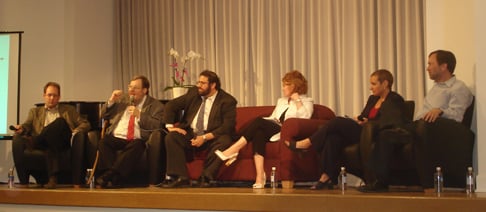This article is more than 1 year old
Microsoft: 'We will save America from foreign domination'
The Great White Space Hope
Innovation 08 Microsoft has a plan for sending high-speed net traffic over America's television white spaces. And it's sure the country will eat some serious foreign dust if this plan gets snuffed.
"Across the nation, there are vast swathes of unoccupied TV spectrum, and we - along with other tech companies - are asking that this spectrum be used for a what is essentially WiFi on steroids," Microsoft senior director of public policy Marc Berejka said yesterday during a panel discussion at Santa Clara University.
"If we fail on white spaces, what does that mean for the country's reputation in the world as innovators? We have the potential to be leaders on spectrum policy, but if we don't push white spaces through, it will happen somewhere else. Some country will take the lead, and entrepreneurs will innovate over there."
But as Berejka admits, not everyone agrees with him. This white space idea is opposed by the nation's TV broadcasters, the wireless microphone industry, and hospitals who like to monitor people walking through their hallways. Not to mention the other panelists at yesterday's Media Access Project Innovation 08 gathering.

Analyst Coleman Bazelon, economist Gregory Rose,
Media Access Project's Harold Feld, CTIA's Carolyn Brandon,
Columbia Telecommunications' Joanne Hovis, Microsoft's Marc Berejka
Microsoft wants to turn America's white spaces - portions of the TV band that aren't used for broadcasting - into unlicensed spectrum. That means anyone could buy devices off-the-shelf and grab some wireless bandwidth - as we now do with WiFi. The difference is that this spectrum offers much better propagation properties. Those net-centric wireless signals could travel over much longer distances - and at higher speeds.
One of Berejka's fellow panelists, industry analyst Coleman Bazelon, isn't opposed to using the white spaces for net access. But he doesn't like the unlicensed idea. "I agree that [the white space spectrum] is a valuable resource that's up for grabs," said Bazelon, a principal with the Battle Group. "But if we don't license it and put it into the hands of companies that will invest in infrastructure to develop, it's going to be wasted."
Of course, if it is licensed and auctioned off to the highest bidder, it will likely fall into the hands of the wireless old guard. Think AT&T and Verizon. After all, that was the inevitable result of the epic 700-MHz auction. Officially, Microsoft has nothing but good things to say about the old guard, but in this case, it wants truly open airwaves. Redmond has even gone so far as to partner with Google on its white spaces project. Yes, Google.
At yesterday's panel, the old guard was represented by the CTIA wireless association. And naturally, the association said it would prefer that the white spaces be auctioned off to the highest bidder.
"We don't think white spaces should be given away for free," said Carolyn Brandon, the CTIA's vice president of policy. "Some of our members have suggested that the white spaces be auctioned off for backhaul. Some have suggested that's not an important enough use, but we say 'Let the market decide what the best use is.'"
So Microsoft tells the truth. If its white space plan bites the dust, so does at least a certain amount of American innovation. That's right: We're siding with Redmond on this one. ®
